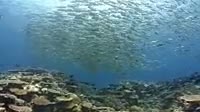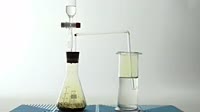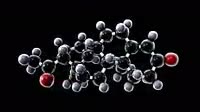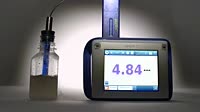Sample of limestone rock reacting with hydrochloric acid. Limestone is a mineral formed of calcium carbonate (CaCO3), which is slightly soluble in water but more so in acid. In this reaction, the limestone reacts with the acid to produce calcium chloride and carbon dioxide gas, which bubbles off. The calcium chloride produced is very soluble in water, and acid can thus speed the dissolution of limestone. Limestones make up around 10% of all the sedimentary rocks on Earth, and limestone landscapes under the influence of slightly acidic rain are commonly riddled with caves and holes, producing what is termed karst topography.
Details
WebID:
C01786165
Clip Type:
RM
Super High Res Size:
1920X1080
Duration:
00:00:31.000
Format:
QuickTime
Bit Rate:
25 fps
Available:
download
Comp:
200X112 (0.00 M)
Model Release:
NO
Property Release
No













 Loading
Loading